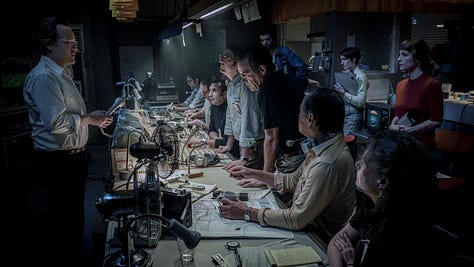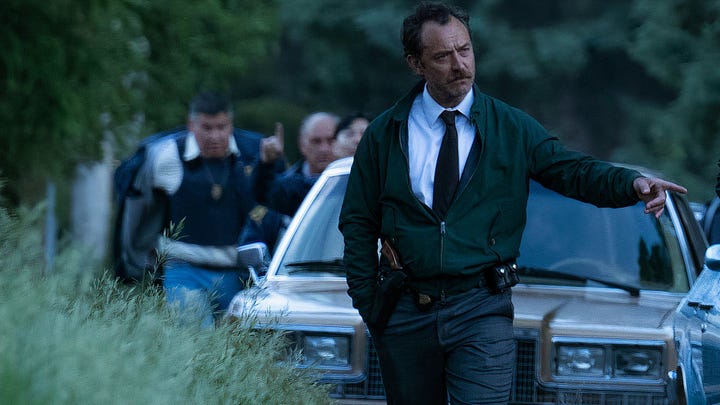Monday new releases: 10 February 2025
Alien Weaponry: Kua Tupu Te Ara, Presence, September 5 and Widow Clicquot are in cinemas and The Order is streaming on Prime Video





New Zealand documentary making was well represented either side of Waitangi Day by The Haka Party Incident and Alien Weaponry: Kua Kupu Te Ara.
There are two main ways a doco can distinguish itself – a great story or great access, and Kent Belcher’s film about the young metal band Alien Weaponry has both. Three teenagers from small town Northland, New Zealand, become stars of the globally competitive heavy metal scene by shredding brilliantly and bringing their own culture to the party – adding not imitating.
Brothers Henry (drums) and Lewis De Jong (guitar), along with former bass players Ethan and Wyatt, got their early breaks on the cultural phenomenon that is Smokefree Rockquest and were already touring the festivals of Europe and North America by the time they were 18 and 16 respectively. Traveling with their dedicated parents, Niel and Jette, they were also followed on that first big 2018 trip by Belcher’s camera.
He’s been around the band for six or so years which brings a remarkable intimacy to a documentary that might easily have had the edges polished off by a careful record company. Instead, we see relationships frazzle, temptations being succumbed to, and – in a heartbreaking sequence – one brother’s youthful exuberance threaten years of work.
If you are not a big fan of the genre, don’t worry because there’s not enough of the music to put you off – just enough to give you an idea of what the passionate blend of thrashing guitars and Māori waiata can be like. The metal community looks scary from the outside but we also see how much aroha is generated by these boys and their uniquely committed vision.
There’s a Swedish film called The Five Obstructions in which, avant-garde filmmaker Jørgen Leth is challenged by Lars von Trier to remake his 1960s short film The Perfect Human several times with an increasingly bizarre set of constraints. I wonder whether Steven Soderbergh is doing the same thing to himself during this period of his career. As if he’s finding that filmmaking comes to him so easily he has to choose restrictions in order to keep things interesting. Make a big budget HBO drama series 10-months after “retiring” (The Knick), release a film as a mobile phone app (Mosaic), shoot with only an iPhone (Unsane), shoot during a two-week transatlantic sea voyage (Let Them All Talk), shoot a Hitchcockian thriller at the height of a pandemic (Kimi), make a science-fiction series to be released for free on the web (Command-Z).
With Presence, Soderbergh hasn’t chosen a production difficulty, more of a challenging storytelling device. The film is a ghost story told entirely from the point of view of the ghost – a first-person viewpoint from something that may not even be a someone.
A family of four buys a big old house and settles in but, despite the happy outward appearances, everyone has their troubles. Mum Rebecca (Lucy Liu) is a successful executive but may have made some unwise choices that threaten the family with legal jeopardy. Son Ryan (Eddy Maday) is an ambitious swim champ with a judgemental streak. Daughter Chloe (Callina Liang) is grieving the sudden death of a close friend. Dad Chris (Chris Sullivan) is struggling to keep the family together – the film is called Presence after the entity that they share the house with but it could just as well be about the lack of presence that they have in each other’s lives.
One could quibble about the logic a little bit – this poltergeist hovers with a steadicam-like point-of-view but still uses the stairs rather than float over the bannisters – but using the device to eavesdrop on different family members (and their guests) and occasionally intervene is quite a neat way to parcel out information.
There are a couple of jumpy moments but this is a haunted house film rather than a gory horror – unlike the trailers that played beforehand for films that I am really not looking forward to.
September 5 is a history lesson set around the 1972 Munich Olympics terrorist tragedy in which Palestinian freedom fighters took advantage of global visibility to take several members of the Israeli team hostage. The story isn’t particularly interested in their cause, however, but does take an interest in the irony that these Jewish athletes were attacked on German soil, reminding everyone of a history that they were trying to forget.


